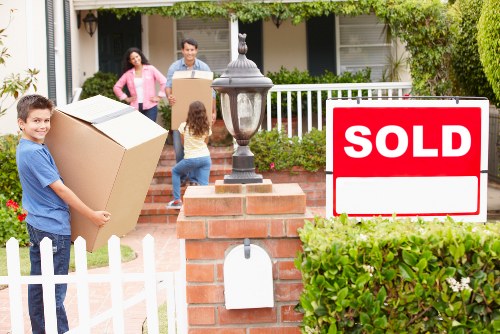Waste Disposal in St Albans

Proper waste disposal is essential for maintaining a clean and healthy environment in St Albans. As the city grows, so does the volume of waste generated by households and businesses. Effective waste management ensures that waste is handled responsibly, reducing the impact on the environment and promoting sustainability.
St Albans offers a range of waste disposal services tailored to meet the needs of its residents. From regular household waste collection to specialized recycling programs, the city is committed to providing comprehensive solutions for waste management.
Understanding the available waste disposal options can help residents make informed decisions about how they handle their waste, contributing to a greener and more sustainable community.
Introduction to Waste Disposal in St Albans
Waste disposal in St Albans encompasses a variety of services designed to manage the waste produced by its residents and businesses. The city prioritizes efficient waste collection, recycling, and disposal to minimize environmental impact and promote public health.
The waste disposal system in St Albans is structured to accommodate different types of waste, including general household waste, recyclables, and hazardous materials. By categorizing waste effectively, the city ensures that each type of waste is handled appropriately.
Residents can access waste disposal services through scheduled collections, recycling centers, and special disposal events. These services are supported by initiatives aimed at reducing waste generation and encouraging sustainable practices.

The importance of proper waste management cannot be overstated. It not only keeps the city clean but also protects natural resources, reduces pollution, and conserves energy. Effective waste disposal strategies contribute to a healthier environment and enhance the quality of life for all residents.
St Albans has implemented various programs to promote recycling and reduce landfill usage. These initiatives include awareness campaigns, easy-to-use recycling facilities, and incentives for businesses and households to participate in waste reduction efforts.
By fostering a culture of responsibility and sustainability, St Albans aims to achieve long-term environmental goals and set an example for other communities.
Importance of Proper Waste Management
Proper waste management is crucial for preventing environmental degradation and maintaining public health. It involves the systematic collection, transportation, processing, recycling, and disposal of waste materials.
Services Available in St Albans
St Albans provides a comprehensive range of waste disposal services tailored to meet the diverse needs of its population. These services ensure that waste is managed efficiently and sustainably.
Household Waste Collection
Regular household waste collection is a cornerstone of St Albans' waste management strategy. Scheduled pickups ensure that waste is collected promptly and disposed of in an environmentally friendly manner.
Recycling Programs
Recycling programs in St Albans encourage residents to separate recyclables from general waste. These programs help reduce the amount of waste sent to landfills and conserve natural resources.
Hazardous Waste Disposal
Specialized facilities are available for the disposal of hazardous waste. These facilities ensure that harmful materials are handled safely to prevent environmental contamination.

Residents of St Albans have access to various waste disposal options that cater to different types of waste. From curbside collection to specialized recycling centers, the city offers flexible solutions to meet individual needs.
Curbside collection services provide the convenience of having waste collected directly from homes. This service helps maintain cleanliness and reduces the need for residents to transport waste manually.
Recycling centers in St Albans accept a wide range of recyclable materials. These centers play a pivotal role in promoting recycling and ensuring that valuable materials are reused effectively.
Waste Disposal Options for Residents
St Albans offers a variety of waste disposal options to accommodate the diverse needs of its residents. These options are designed to promote sustainability and ensure that waste is managed responsibly.
Residents can choose from several disposal methods based on the type and volume of waste they produce. Understanding these options helps in selecting the most appropriate and environmentally friendly method of waste disposal.
By providing multiple disposal options, St Albans empowers its residents to take an active role in waste management and contribute to the city's sustainability goals.

Curbside collection is one of the most convenient waste disposal options available to residents. This service involves the regular pickup of waste from designated containers placed outside homes.
Recycling centers offer a dedicated space for residents to drop off recyclable materials. These centers accept items such as paper, plastics, metals, and glass, ensuring that they are processed and reused effectively.
Composting is another waste disposal option that helps reduce organic waste. Residents can convert kitchen scraps and garden waste into nutrient-rich compost for use in gardening and landscaping.
Curbside Collection
Curbside collection services are designed to provide hassle-free waste disposal for residents. Scheduled pickups ensure that waste is collected regularly, maintaining cleanliness in the community.
Recycling Centers
Recycling centers play a vital role in waste management by providing facilities for residents to recycle various materials. These centers help divert waste from landfills and support the reuse of valuable resources.
Composting
Composting reduces the amount of organic waste sent to landfills and produces compost that benefits soil health. This eco-friendly practice supports sustainable gardening and agriculture.
Electronic Waste Recycling
Electronic waste recycling services ensure that old electronics are disposed of safely and responsibly. These services prevent harmful substances from entering the environment and promote the recovery of valuable materials.
Bulk Waste Pickup
Bulk waste pickup addresses the disposal of large items that cannot be handled through regular waste collection. This service is essential for managing bulky household items, such as furniture and appliances.

The environmental impact of waste disposal is a critical consideration for St Albans. Proper waste management practices help reduce pollution, conserve resources, and protect ecosystems.
Reducing landfill usage is a key environmental objective. By diverting waste through recycling and composting, the city minimizes the strain on landfill sites and lowers greenhouse gas emissions.
Promoting recycling and reuse contributes to the conservation of natural resources and decreases the demand for raw materials. These practices support a circular economy and encourage sustainable consumption patterns.
Environmental Impact of Waste Disposal
Effective waste disposal has significant environmental benefits. It helps in reducing pollution, conserving natural resources, and mitigating climate change impacts.
St Albans is committed to implementing waste disposal practices that are environmentally responsible. By focusing on recycling, composting, and reducing landfill usage, the city aims to create a sustainable future for its residents.
Community involvement and education are essential components of achieving these environmental goals. St Albans actively engages its residents in waste reduction initiatives and promotes awareness of sustainable practices.

Reducing landfill usage is a primary goal of St Albans' waste management strategy. Landfills are significant sources of methane emissions, a potent greenhouse gas that contributes to climate change.
By diverting waste from landfills through recycling and composting, the city reduces its carbon footprint and helps combat global warming. This approach also extends the lifespan of existing landfill sites, delaying the need for new ones.
Promoting recycling and reuse ensures that valuable materials are recovered and reintroduced into the production cycle. This practice lowers the demand for virgin materials, preserving natural resources and reducing energy consumption.
Reducing Landfill Usage
St Albans is actively working to decrease the amount of waste sent to landfills. This effort involves enhancing recycling programs, promoting composting, and encouraging waste reduction at the source.
Promoting Recycling and Reuse
Recycling and reuse initiatives in St Albans help conserve natural resources and reduce environmental impact. These programs are essential for creating a sustainable waste management system.
Sustainable Waste Practices
Sustainable waste practices focus on minimizing waste generation, maximizing recycling, and ensuring the safe disposal of remaining waste. St Albans incorporates these practices into its waste management policies to achieve long-term sustainability.
Community Initiatives
Community initiatives play a vital role in promoting sustainable waste practices. St Albans supports various programs that engage residents in waste reduction and environmental protection efforts.
Education and Awareness
Education and awareness campaigns are critical for fostering a culture of sustainability. St Albans provides resources and information to help residents understand the importance of proper waste disposal and how they can contribute.

Despite the progress made, waste disposal in St Albans faces several challenges. Balancing the demand for waste management services with available capacity is a constant struggle.
Managing hazardous materials requires specialized facilities and procedures to prevent environmental contamination. Ensuring that these materials are disposed of safely is a top priority for the city.
Public participation is essential for the success of waste disposal programs. Encouraging residents to actively engage in recycling and waste reduction efforts is an ongoing challenge that St Albans continues to address.
Challenges in Waste Disposal
Waste disposal in St Albans faces multiple challenges that need to be addressed to maintain an effective and sustainable waste management system.
Overcoming these challenges requires collaboration between the city, residents, and businesses. By working together, St Albans can develop strategies to improve waste disposal services and promote environmental stewardship.
Addressing these challenges is crucial for ensuring that waste disposal remains efficient, environmentally friendly, and responsive to the needs of the community.

Balancing demand and capacity is one of the primary challenges in waste disposal. As the population grows, the volume of waste increases, putting pressure on existing waste management infrastructure.
Innovative solutions and investments in waste management facilities are necessary to accommodate the growing demand and maintain high standards of service.
Managing hazardous materials poses significant risks to the environment and public health. Proper disposal techniques and facilities are essential to mitigate these risks and prevent contamination.
Balancing Demand and Capacity
As St Albans' population continues to grow, the demand for waste disposal services increases. Ensuring that waste management infrastructure can keep up with this demand is critical for maintaining service quality.
Managing Hazardous Materials
Proper handling and disposal of hazardous materials are essential to prevent environmental contamination and protect public health. St Albans implements strict guidelines and provides specialized disposal facilities for these materials.
Public Participation
Public participation is vital for the success of waste disposal programs. Encouraging residents to take an active role in recycling and waste reduction efforts helps achieve the city's environmental goals.
Accessibility of Services
Ensuring that waste disposal services are accessible to all residents is a key challenge. St Albans works to provide equitable access to waste management facilities and services across the community.
Funding and Resources
Securing adequate funding and resources for waste disposal programs is essential for their sustainability. St Albans seeks to optimize its budget and explore funding opportunities to support waste management initiatives.

St Albans is surrounded by several nearby areas, each offering unique features related to waste disposal. Understanding the proximity and services available in these areas can help residents choose the best waste management options.
- Harpenden: Located just north of St Albans, Harpenden provides additional recycling centers and bulk waste pickup services.
- Wivenhoe: To the west, Wivenhoe offers specialized hazardous waste disposal facilities.
- Aldenham: Southwest of St Albans, Aldenham has community composting programs available for residents.
- Redbourn: East of St Albans, Redbourn features convenient curbside collection services similar to those in St Albans.
- Bushey: South of St Albans, Bushey provides electronic waste recycling centers accessible to both residents and businesses.
- St Stephen: Adjacent to St Albans, St Stephen offers combined recycling and waste disposal services, enhancing resource recovery.
- Sandridge: Located nearby, Sandridge has dedicated facilities for garden waste recycling and composting.
- St Michael: Close to St Albans, St Michael supports local waste reduction initiatives and public education programs.
- London Colney: Southeast of St Albans, London Colney features extensive recycling programs and community clean-up events.
- Hill End: Northwest of St Albans, Hill End provides bulk waste pickup services to manage large household items effectively.
- Vineyard: Situated near St Albans, Vineyard offers accessible recycling centers and supports sustainable waste practices.
- Redbournbury: To the northeast, Redbournbury has specialized facilities for the disposal of construction and demolition waste.
- Ranston: West of St Albans, Ranston features eco-friendly waste disposal options, including community recycling drives.
- Verulam: Close to St Albans, Verulam offers comprehensive waste management services, including hazardous waste disposal.
- Batchworth: Southwest of St Albans, Batchworth provides innovative recycling programs and supports local sustainability efforts.
Nearby Areas with Waste Disposal Services
Living in St Albans means having access to a network of nearby areas that enhance waste disposal services. These areas complement the city's efforts by providing additional facilities and specialized services, ensuring that residents have ample options for managing their waste responsibly.
Each nearby area offers unique features that cater to specific waste disposal needs. By leveraging the resources available in these areas, residents can ensure that their waste is handled efficiently and sustainably.
Understanding the waste disposal options in nearby areas contributes to a more comprehensive and effective waste management system in the broader region surrounding St Albans.
Conclusion
Waste disposal in St Albans is a well-structured system that prioritizes environmental sustainability and public health. With a range of services including household waste collection, recycling programs, and hazardous waste disposal, the city ensures that waste is managed responsibly.
By offering diverse waste disposal options and engaging the community in sustainable practices, St Albans fosters a clean and healthy environment for its residents. The collaboration between the city and nearby areas further strengthens the waste management infrastructure, promoting a greener future for the entire region.
Continued efforts in education, resource allocation, and community involvement are essential for maintaining and improving waste disposal services in St Albans. By staying committed to these goals, the city can effectively manage waste and protect its natural resources for generations to come.
Frequently Asked Questions
- What types of waste are collected during regular household waste collection in St Albans?
Regular household waste collection in St Albans includes general waste such as non-recyclable materials, food scraps, and other everyday refuse. Residents are encouraged to separate recyclables and compostable materials to enhance waste management efficiency.
- How can I dispose of hazardous waste in St Albans?
Hazardous waste disposal in St Albans is handled through specialized facilities and collection events. Residents should contact the local waste management authority to learn about scheduled hazardous waste pickups and the proper procedures for disposal.
- Are there any recycling incentives for residents in St Albans?
Yes, St Albans offers various recycling incentives, including reduced waste collection fees for households that actively participate in recycling programs. Additionally, the city may provide resources and support for setting up home recycling stations.
- Where can I find the nearest recycling center in St Albans?
The nearest recycling centers in St Albans can be found by visiting the city's official waste management website or contacting the local waste disposal authority. The website provides a map and detailed information about each recycling facility.
- How does composting benefit the environment in St Albans?
Composting reduces the amount of organic waste sent to landfills, lowers greenhouse gas emissions, and produces nutrient-rich compost that improves soil health. This sustainable practice supports local gardening and agriculture, contributing to a healthier environment.